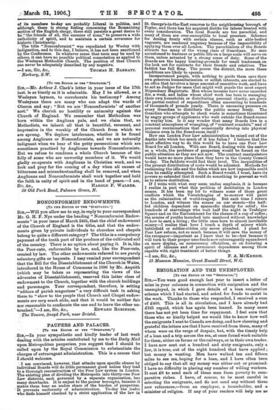ON THE GROWTH OF THE NEWER NONCONFORMITY.
[To THE EDITOR Or THII "SPECTATOR,"] Sra,—While cordially sympathising with the sentiments expressed by your correspondent, Mr. Clark, in the Spectator of March 17th, I cannot refrain from expressing my astonish- ment at his conceiving that there is anything "new" about a Nonconformity which is not hostile to the Church of England, and which is unidentified with any one political party.
The largest non-Established Church in this country is the Wesleyan Methodist. That Church has from its earliest days until now consistently refused to join in any attack upon the Anglican Communion, or any other body of fellow-Christians. Methodism did not originate in any political or theological controversy with the Established Church ; its human founder lived and died an English clergyman. Methodism was extruded from within the Anglican Communion for no other reason than that the Church of England of that day unhappily had not sufficient vitality to assimilate it. The early Methodists took with them the Book of Common Prayer, and a tradition of reverence for the Mother-Church, not without its pathos for those who have eyes to see. To this day the Anglican Liturgy is used in great numbers of Wesleyan churches, the Anglican Order for Holy Communion is the only one that is ever used in English Wesleyan churches, and the Anglican Article XXVIII., "Of the Lord's Supper," appears word for word at the end of every Wesleyan Prayer-book.
The Wesleyan Church, of course, allows full liberty of action to individual members in their private capacity, and welcomes every opportunity of uniting with other Christians in religious and philanthropic work; but it has never identified itself as a Church with any political propaganda or with any party, either in Church or State. Its buildings may never be used for political purposes.
In the last Parliament members of the Wesleyan Church held seats in every party, and section of a party, in the House of Commons,—Conservative, Liberal Unionist, Liberal Imperialist, Radical, Labour, and Nationalist. Can any other Church give a similar proof of political catholicity ? Since Wesley died the changes have been bewildering. The Methodist Communion has multiplied itself by more than seventy, and to-day it far out- numbers the Anglican in the English-speaking world. In so large a Communion extremists of many types naturally have a place, but in the Wesleyan Church at least, although the majority
of its members to-day are probably Liberal in politics, and although there is strong feeling concerning the Romanising section of the English clergy, there still persists a great desire to be "the friends of all, the enemies of none," to preserve a wide catholicity of spirit, and to maintain a certain reverence for historic Christianity.
The title "Nonconformist" was repudiated by Wesley with indignation, and to this day, I believe, it has not been sanctioned by the Conference. In whatever sense that term may be used by others, it can have no possible political connotation as applied to the Wesleyan Methodist Church. The position of that Church can never be adequately described by any negative.
Norbury,











































 Previous page
Previous page